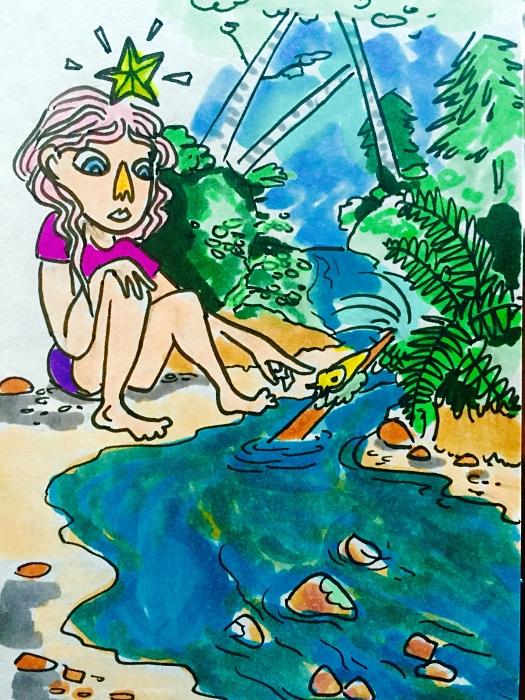The Garlick Press: The curse of affluenza
How affluenza is killing our inner modern child and the beauty of the outdoors
Photo by Kira Garlick
My favorite thing in the world is the banana slug. Bright yellow decomposers, these mollusks grow to be as big as your foot and will numb your tongue if you lick them. They reside in a paradise I fell in love with as a small child: Humboldt County.
Humboldt has overcast skies and freezing beaches, with the tallest trees to tower over the planet. These trees are redwoods, giants that thrive in the coastal fog. The pinnacle of tourist traps and the palace of Bigfoot. Humboldt is beautiful.
Most of us live in the suburbs, surrounded by more asphalt than clean atmosphere. We can’t see the stars in the sky at night due to light pollution. That’s the consequence of industrialization, but our individual lack of the outdoors is causing a new epidemic, one that many are blind to: affluenza.
Defined as the condition of laziness and overconsumption from wealth, affluenza is the only sickness urban people should be worried about contracting. Consumers buy too many things, degrading their health with crippling lethargy, all while destroying the world around them.
It has been proven that the outdoors increase one’s well being, clearing the mind and making one feel happier.
A Canadian study revealed people living in rural areas had a “stronger sense of community belonging,” and showed a lower risk to anxiety and depression, according to Medical Daily.
The affluenza plague has even created new problems.
Believe it or not, Nature Deficit disorder is an actual thing. The condition of not having enough exposure to wildlife serves as an explanation to our modern cognitive behavior, though it’s not a formal diagnosis, according to Psychology Today.
Either way, it seems to be true: our generation would rather binge-watch netflix than play in the backyard or go exploring in the nearby wilderness.
This couch potato syndrome is causing a plethora of health issues. Not only are rates for cancer and cardiovascular diseases accumulating, but we are also getting dumber. A study by Medical Daily shows that watching large amounts of television in your twenties can slow your processing and cognitive functions, damaging your brain. How about that for a desk job?
Additionally, the planet is suffering from our expenses. The planet’s variety of species has decreased by 30 percent, according to The Daily Star. Humanity is using more resources than one planet can provide, according to the World Wildlife Fund.
It may seem like this contagious outbreak of affluenza will cause the world to end, but that is far from the truth. Simple fixes to your lifestyle can yield enormous change.
When it comes to walking, it doesn’t matter where you live. Even if it’s just around a city block, a short, brisk walk decreases the risk of stroke, according to a Harvard Study.
Fresh air is a natural medicine, and it can tend to mental and physical illnesses. Ecotherapy is a generally new form of therapy healing through connection with the natural world with nature meditation and animal assisted therapy, according to GoodTherapy.org.
There are people who do not have the same connection with the outdoors that I do, or who may not have much interest in it either, but you can still beat affluenza in other ways.
Being thrifty is another achievable option. Many of us own items we never use, which we can recycle or donate to charitable areas near us.
The idea of healing through purging useless things is called minimalism. The Minimalists are two men who document and share their lifestyle, They live with few possessions and believe the practice helps them release fear, worry and guilt.
Affluenza is a menacing, invisible evil, but it can be beaten. It just takes the consideration of your own actions. If you are buying something at Walmart, think twice about if you’ll need it in the next two weeks. Step outside before dinner and walk around the block instead of blindly clicking over to the next episode of Brooklyn 99.
When it comes to connecting with wildlife, visit the countryside when you can and take the memories with you.
I’m grateful that I can visit the giant redwoods every summer and at Christmas, and enjoy the beaches with my relatives. Not many people are as lucky as I am, but if you ever get the chance to drive 265 miles up along the Californian Coastline, lick a banana slug for me.
Either way, nature and the redwood forest, like any other congregation of trees, is a form of medicine no one can deny or overlook. It is a necessity to the human being.









Don garlick • Dec 2, 2016 at 3:21 pm
I like your cartoon. I just wish banana slugs would not use homes as repositories for their crap.
Don garlick • Dec 2, 2016 at 3:18 pm
An excellent summary of the benefits of experiencing and preserving nature.
But “The Minimalists are two men …” suggests that 2 men is the ideal. Could you have written: “The Minimalists are two humans….”?